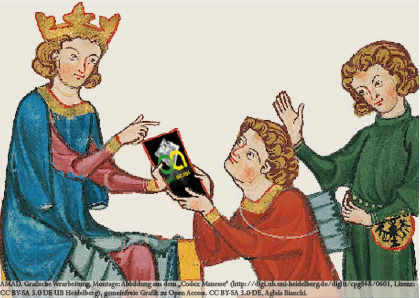AMAD
„Archivum Medii Aevi Digitale - Interdisziplinäres Open-Access-Fachrepositorium und Wissenschaftsblog für Mittelalterforschung‟Zur Einreichung

Langanzeige der Metadaten
| DC Element | Wert | Sprache |
|---|---|---|
| Autor*in | Clement, Richard W. | - |
| Datum | 1997 | - |
| Quelle | https://digitalcommons.usu.edu/cgi/viewcontent.cgi?article=1010&context=lib_pubs | - |
| Quelle | https://digitalcommons.usu.edu/lib_pubs/10 | - |
| URI | https://www.amad.org/jspui/handle/123456789/71240 | - |
| Beschreibung | There is a widely held, yet erroneous, belief that the invention of the book was concurrent with the invention of printing. Somehow it is assumed that the act of printing--that is producing a book by mechanical means--endows the finished product with that essence that embodies a book. After all, the hand-produced book is called a manuscript, not simply a book, and early-printed books are called incunabula, books in their infancy. We are accustomed to think of the periods of manuscripts and printed books as distinct. Traditionally a scholar working in one of these fields has known little of the other field. Even our libraries have perpetuated this dichotomy: manuscripts are always separate from printed books, both administratively and physically. Yet historically this is a false dichotomy. The printed fifteenth-century book was a direct imitation of the contemporary manuscript book. Yet perhaps talk of imitation is misleading. Gutenberg never intended to imitate anything or mislead anyone: he was merely making books by a new means. The end product was really little different than the product of the scriptorium. It was the means of production which was revolutionary, not the book itself. The book, or more properly the codex, was invented in the first century AD, and has continued to this day with relatively few changes. | - |
| Format | application/pdf | - |
| Sprache | unknown | - |
| Rechte | Copyright for this work is held by the author. Transmission or reproduction of materials protected by copyright beyond that allowed by fair use requires the written permission of the copyright owners. Works not in the public domain cannot be commercially exploited without permission of the copyright owner. Responsibility for any use rests exclusively with the user. For more information contact the Institutional Repository Librarian at digitalcommons@usu.edu. | - |
| Schlagwörter | book production | - |
| Schlagwörter | Library and Information Science | - |
| Schlagwörter | renaissance | - |
| Schlagwörter | medieval | - |
| Dewey-Dezimalklassifikation | 940 | - |
| Titel | Medieval and Renaissance book production | - |
| Typ | text | - |
| AMAD ID | 579250 | - |
| Jahr | 1997 | - |
| Open Access | 1 | - |
| Enthalten in den Sammlungen: | BASE (Bielefeld Academic Search Engine) General history of Europe | |
Dateien zu dieser Ressource:
Es gibt keine Dateien zu dieser Ressource.
Alle Ressourcen in diesem Repository sind urheberrechtlich geschützt, soweit nicht anderweitig angezeigt.

